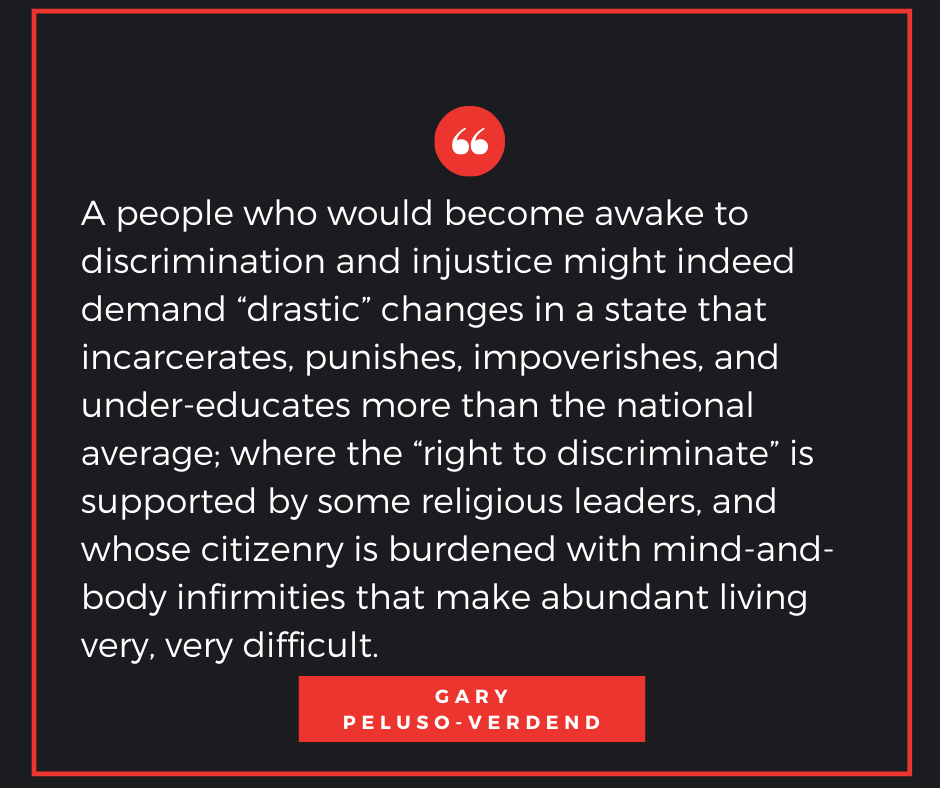Woke or Awakening?
(Note: after writing this blog, I discovered there is a substantial, serious literature from conservative voices claiming that “woke” and “awake” represent very different religious values and social mandates. It is a literature with which I should become acquainted. But I did not write the following with a woke/awake dichotomy in mind. My point of view is different.)
 “Folks, Oklahoma won’t go woke.” That’s a theme Secretary of Education Ryan Walters repeated on election night. The secretary has often sounded that theme, or alarm. He defines woke this way: “ ‘Wokeness’ is this belief that you need to change drastically society…. It is an attack on the family unit. It is an attack on the values that have made America great. It is an attack on America and American exceptionalism.”’ He links wokeness to “indoctrination” and silencing, or canceling, dissenting voices.
“Folks, Oklahoma won’t go woke.” That’s a theme Secretary of Education Ryan Walters repeated on election night. The secretary has often sounded that theme, or alarm. He defines woke this way: “ ‘Wokeness’ is this belief that you need to change drastically society…. It is an attack on the family unit. It is an attack on the values that have made America great. It is an attack on America and American exceptionalism.”’ He links wokeness to “indoctrination” and silencing, or canceling, dissenting voices.
The Oxford English Dictionary offers a different definition of “woke” (and Merriam-Webster’s take is very close to the OED): “Originally: well-informed, up-to-date. Now chiefly: alert to racial or social discrimination and injustice; frequently in stay woke (often used as an exhortation).”
In Oklahoma, according to the secretary, anti-wokeness means we will “empower parents,” channel funding from public education toward private schools through vouchers (despite the reality of the dearth of private schools in rural areas), and teach students a state-enforced “correct” view of American and state history.
But no indoctrination.
If we look at these beliefs and policies from the clashing definition of the OED, then one might conclude Oklahomans shall not be well-informed or up-to-date in education; and we will not be alert to social discrimination and injustice.
Hmmm.
So, I’ve been wondering: Is being woke anything like being “awake?”
From the point of view of religions, being awake is essential to right living. After the Buddha experienced enlightenment, he was asked what he was. His answer: “I am awake.” When Jesus taught his followers how to be ready to receive God’s Reign that would replace Rome’s Reign, he admonished them to stay awake. Abraham and Jacob, Joseph (Jacob’s son), Joseph and Mary—among others—received dreams from which they woke and then acted in the direction the dreams pointed. “Light” and “sunrise” are critical symbols in many religions and are associated with being awake or awakening, as distinct from sitting in the darkness of ignorance and/or oppression. Two of the mass Christian movement periods in American history are the first and second “great awakenings.”
Being awake or, more accurately for most people, becoming awake means seeing and hearing clearly, attending to what is really going on without the distorting powers of fear, worry, or anxiety.
Choose your spiritual discipline: prayer, contemplation, meditation, yoga, lectio divina, singing, gardening, chop wood, carry water. One of the hoped-for experiences derived from long attention to a spiritual practice is becoming more awake: seeing the world, seeing ourselves, seeing God, seeing relationships and connections more clearly.
Now, no religious adept person claimed becoming awake would be comfortable or easy. Becoming awake is more like being born: pushed out of a cozy, contained, warm space into a world where you have to breathe, where you get cold, where you have to work to eat; a noisy world and you may need a slap on the rump or a suction device stuck into your mouth or nose to get you going.
And one more thing about becoming awake: you’ll see yourself, the world, and the Ultimate differently from when you were asleep or living in twilight. Like Neo’s character in the Matrix series who comes to see the real world, one cannot unsee a shock-awake revelation.
A people who would become awake to discrimination and injustice might indeed demand “drastic” changes in a state that incarcerates, punishes, impoverishes, and under-educates more than the national average; where the “right to discriminate” is supported by some religious leaders, and whose citizenry is burdened with mind-and-body infirmities that make abundant living very, very difficult.
Perhaps our leaders are using “woke” as a slur because they fear what an awake citizenry might see, hear, attend to—and demand.
Am I “woke”? No, I would not claim that state of being. But I would claim “becoming awake.” To paraphrase Methodism’s founder, John Wesley, who was speaking of the lifelong journey to be made complete in and by love: if you’re not walking a path of becoming awake, where are you going?
Dr. Gary Peluso-Verdend is president emeritus at Phillips Theological Seminary and is the executive director of the seminary’s Center for Religion in Public Life. The opinions expressed in this blog are those of the author. Learn more about the Center’s work here and about Gary here.


Comments are closed.